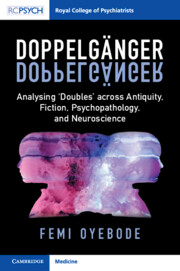Refine search
Actions for selected content:
2 results
Chapter 3 - The Double as Other in the Novel
-
- Book:
- Doppelgänger
- Published online:
- 13 March 2025
- Print publication:
- 20 March 2025, pp 33-77
-
- Chapter
- Export citation

Doppelgänger
- Analysing ‘Doubles' across Antiquity, Fiction, Psychopathology, and Neuroscience
-
- Published online:
- 13 March 2025
- Print publication:
- 20 March 2025
